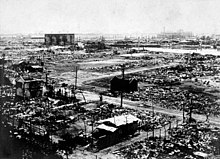
Quick Facts

Biography
Taichiro Morinaga (1865–1937) was a Japanese philanthropist and entrepreneur. In 1918, he founded Morinaga & Co, the first modern candy company in Japan, and the first to produce chocolates in the country.
Now known for the popular fruit candy Hi-Chew, one of Morinaga & Co's first products was marshmallow.[1][2]
Early life
Morinaga (1865–1937) was born on Japan's southern island of Kyushu. He had no formal education. His father died when he was 7. Later he became a potter's apprentice and went to Tokyo in his teens to sell pottery. He became a branch manager for a wholesaler in nearby Yokohama but his branch lost money after extending too much credit to customers because of leniency. Since employees were personally responsible for such losses, Morinaga searched for a way to repay his boss.
With no local prospects found to repay the loss, Morinaga, at age 23, moved to the United States where he opened a hardware store in San Francisco. However, the venture was unsuccessful due to local boycotting due to his race. During the visit, he converted to Christianity.
Candy pioneer in Japan
During his time in the United States, an unidentified American gave him a piece of candy which was a new appetizing treat for Morinaga. Having led an impoverished life in Japan, Morinaga had never tasted such a delicious treat. At the time, candy in Japan was expensive and consisted of either boiled beans or bee honey, which was based on sweets originally brought by Chinese and Portuguese traders centuries earlier or even more expensive candy imported from Europe. Morinaga returned to Japan but came to the United States for a second time. He was unable to obtain candy apprentice jobs in the United States because of his race. Instead, he worked as a janitor in a candy factory to gain experience. After interviewing a number of Japanese people in the United States, Moringa discovered that marshmallows were popular but unavailable in Japan. This second visit to study candy manufacture lasted ten years.
In 1899, he left the United States and initially sold candy from a push cart. Later that year, he opened a candy shop in Tokyo (Minato City), the Morinaga Western Confectionery Shop (later Morinaga Confectionery), with Hanzaburo Matsuzaki, a business partner and fellow Christian.
Morinaga later founded Morinaga & Co, the first modern candy company in Japan and the first to produce chocolates in the country when it started in 1918, one year after opening a company dairy. Morinaga is considered one of Japan's greatest industrialists who was not part of a zaibatsu. Early difficulties of the company included the fact that Japan had little commercial milk production, obliging the company to open its own dairy. Another difficulty was that Japan had little arable land for crops and no locally produced corn or sugar cane to make corn syrup.
Currently, Morinaga & Co. is one of Japan's biggest candy makers, with 2008 sales of $1.5 billion and over 5,000 employees. The company also operates restaurants, coffee shops, cafeterias and golf courses in Japan. The affiliated company, Morinaga Milk Industry, sells powdered milk and other dairy products worldwide, as well as health food snacks. In 2008, Morinaga America, Inc. was opened in the United States.
One of his early products were marshmallows, which he called "angel food" because of their color and the association with Christianity, his own religion. He developed a type of caramel, called Hi-Chew, became one of his flagship products and resistant to turning into goo in hot Japanese weather, unlike caramel formulations that he had seen in the United States. His formulation was less buttery and appealed better to the Japanese taste.
Legacy
After the Great Kantō earthquake, Morinage led the rescue efforts and also distributed sweets to people displaced by the disaster.

In 1944, Morinaga's company, with the Army Medical School of Japan, was the first to produce penicillin, an antibiotic drug, in Japan.
